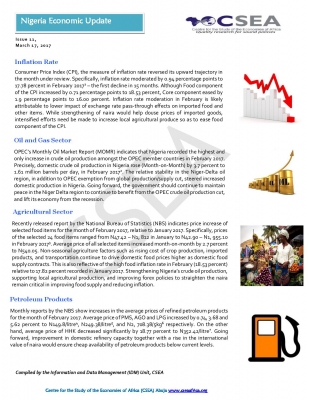Macroeconomic Report & Economic Updates

April 4, 2017
Nigeria Economic Update (Issue 11)
Recently released report by the National Bureau of Statistics (NBS) indicates price increase of selected food items for the month of February 2017, relative to January 2017. Specifically, prices of the selected 24 food items ranged from N47.42 N1, 812 in January to N42.90 N1, 955.10 in February 2017. Average price of all selected items increased month-on-month by 2.7 percent to N540.05. Non-seasonal agriculture factors such as rising cost of crop production, imported products, and transportation continue to drive domestic food prices higher as domestic food supply contracts. This is also reflective of the high food inflation rate in February (18.53 percent) relative to 17.82 percent recorded in January 2017. Strengthening Nigerias crude oil production, supporting local agricultural production, and improving forex policies to straighten the naira remain critical in improving food supply and reducing inflation.
